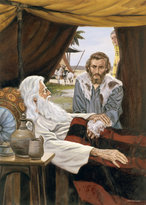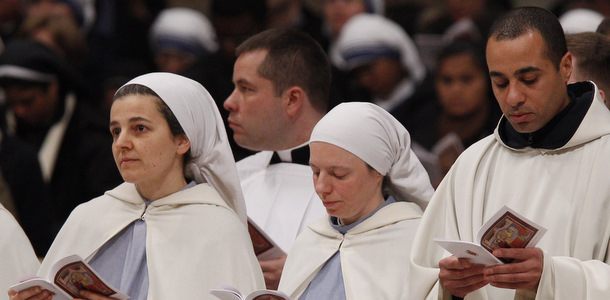PATRISTIC VIGILS READINGS
ORDINARY TIME
WEEKS 1 to 17 : YEAR II
Meister Eckhart - YouTube
www.youtube.com/watch?v=eesLtg5ywrU
21 May 2013 - Uploaded by Eric Gilmour
Interview of Professor Bernard McGinn on Christian Mysticism.
YouTube, Augustine of Hippo together
with Meister Eckhart
Fourt Week in Ord TimeTUESDAY Year II
First Reading
Genesis 28:10-29:14
Responsory Gn
28:11-12.16
While Jacob slept, he saw a stairway rested on the ground, with its top reaching to the heavens, and God's messengers were going up and down on it; t and Jacob awaking from his sleep said: Truly the Lord is here.
V. This is an abode of God and the gateway to heaven. t And Jacob ...
|
Second Reading
From a homily by Saint Augustine of Hippo (Enarr. in Ps 44, 20: ccr, 38, 508-509)
|
Alternative Reading
From a sermon by Meister Eckhart (Sermon 69: Die Deutschen Werke, 159-180)
|
|
Jacob and the anointed stone, which is Christ
Jacob the patriarch set a stone under his head and while he slept, with that stone under his
head, he saw the heavens open and a ladder stretching from heaven to earth, and angels ascending and descending. After seeing this, he woke up, he anointed the stone, and departed. In this stone he understood Christ, that is why he anointed it. Just take a look at what forms the basis of this preaching Christ. What is meant by that act of anointing the stone, especially in the time of the patriarchs, who worshiped the one God?
And this was done symbolically, and then he left. For he did not
anoint the stone, and keep going back there to worship, and to offer sacrifices there. What happened was this: expression was given to a mystery, it was not the grand opening
of a sacrilege. And take a look at the stone: The stone which the builders rejected has become the chief cornerstone. And it is because Christ is the head of man that the stone
is placed at the head. Take note of this great
symbol: the stone is Christ. A living stone, says Peter, rejected by humankind, but specially
chosen by God. And the stone is at
the head, because
Christ
is the head of the man. And the stone is anointed
because the name Christ derives
from anointing.
And as Christ unfolds this picture, a ladder
is seen, from earth to heaven, or from heaven
to earth, and angels ascending and descending. What this is all about we shall see
better when we
have rehearsed the testimony of the Gospel as spoken by the Lord himself. You know that
Jacob himself is Israel. He wrestled with an
angel
and won; he was
blessed by
the one over whom he prevailed. His name was changed and
he was called Israel. This is just like the situation with Jesus and the Jews. The people
of Israel prevailed
over Christ
in such a way as
to crucify him, and yet in the case of those who believed in
Christ, Israel was blessed by the one over
whom it prevailed. But many did not
believe, and that is why Jacob has a limp - blessing and limping both. Blessing
refers to those who have believed. For
we know that afterward many from that
nation did believe. But limping refers to those
who have not believed.
And because
many have not
believed,
and few have believed, the angel touched the broad part of his thigh to bring about this
limping. What
is meant by the broad part of his thigh? The great number of his descendants.
You can
therefore see that ladder. When the Lord
saw Nathaniel
in the gospel, he said: Look, someone
who really is an Israelite, in whom there is no guile. For
this is the sort
of language that was
used about Jacob himself: And
Jacob was free
from guile and he lived at home. The
Lord remembered
this when he saw
Nathaniel free from guile, a member of
that race and that
people. Look, he said, someone who is really
an Israelite, in
whom there is no guile. He called him
an Israelite, in
whom there was no guile because of Jacob. And Nathaniel
said: How do you know me? And
the Lord said: When
you were beneath the fig tree I saw
you. This means, when you were within the Jewish
people and
under the law, which covered over that people with a bodily shadow, that is where I saw
you. What
is meant: that
is where I
saw you?
That is where
I took pity on you.
And Nathaniel thought
back to when he was under the
fig tree in truth, and he was amazed because
he thought that
he had been seen by nobody when
he was there. He made his confession and said: You are the Son of God, you are the king of Israel. Who said this? The
person who
had heard that he was a true Israelite, and
that in him there was no guile. And the Lord said:
It is because I saw you
under the fig tree that
you have believed. You shall see things greater than these. He
is speaking with
Israel,
with Jacob, with the one who placed a stone under his
head. You will see things greater than
these.
What greater
things? The fact that already that stone is by the
head. Truly I tell you, you shall see the heavens opened up, and God's angels ascending and
descending on
the Son of Man. Let God's angels ascend and
descend on that ladder. Let this happen in
the Church. God's angels are
heralds of the truth: let them ascend
and see: In the
beginning
was the
Word, and the Word was with God, and
God was the Word. Let the angels descend and see
that The Word became flesh and dwelt among us. Let
them ascend
so as to lift up those who are grown-ups. Let them descend so as to nourish
the little ones. Watch Paul ascending: If I have taken leave of my senses, it is to God that
I am talking. Watch
him descending: If I am making sense, then I am talking to you. Watch
him ascending: I am speaking of wisdom among the perfect. Watch
him descending:
I have given you milk to drink, not solid food.
This is happening
in the Church: God's angels ascend
and descend on the Son of Man. This is because the Son of Man
is above. They ascend to him in
their heart, that
is, his head. And the Son
of Man is below,
that is, his
body. His
limbs are
here, his head is up above. One rises
up to the head,
comes down
to the limbs. It
is the same Christ
here and there. For were he there only, and
not here, what
would be the point of saying: Saul, Saul, why do you persecute
me? •
Responsory Ps 145:4-5.14
One age shall proclaim your works to another, shall declare your mighty deeds. + People will speak of your splendour and glory, and tell of your wonderful works.
V. The Lord supports all who stumble and
raises
all who are bowed down. + People will speak ...
|
God is near to us
Our Lord says: Know that the kingdom of God is
close to you.
Indeed, the kingdom of God is
within us; God
is closer
to me than I am to myself: my being depends on God's being near me and present to me. So he is also in a stone or a log of
wood, only they
do not know it. If the wood knew God and realized how close he is
to it as the highest angel does, it would be as
blessed as
the highest angel. And so man is more blessed than a stone or a piece of wood because he
is aware of God
and knows how close God is to him. And I am the more blessed, the more I realize this, and I am the less
blessed, the less I know this.
I am not blessed
because God is in me and is near me and because
I possess
him, but because
I am aware of how close
he is to me,
and that I know
God. The prophet says
in the Psalter:
Do not be
without understanding like a mule or a horse. Again, the patriarch Jacob says:
God is in
this place, and I knew
it not. We
should know
God and be aware that God's
kingdom is
near to hand.
Sometimes I declare that in whatever soul God's kingdom dawns, which knows God's kingdom to be near here, is in no
need of sermons or teaching: she is instructed by
it and assured of eternal life, for she knows and is aware how near God's
kingdom is, and she can say with Jacob: God is in this
place, and I
knew it
not - but now I know it.
If
the soul is to
know God, she must forget herself and lose herself:
for if she were aware of herself, she would not be
aware of God: but she finds herself again in God. By
the act of knowing God, she knows herself and in him all things from which she has severed herself.
To the extent
that she has abandoned them, she knows herself totally. If I am truly to
know goodness, I must know it there where
it is goodness in itself, not where goodness is divided. If I am truly
to know being I must know it where being subsists in itself,
undivided: that is, in God.
No
one should
think it is hard to come to this, even though
it sounds hard
and a great
matter. It is true that it is a little difficult in the
beginning
in becoming detached. But when one has got
into it, no life is easier, more delightful or lovelier: and God is
at great pains
to be always with a man and to lead him inward,
if only he is
ready to
follow.
No man ever wanted anything so much as
God wants to bring a man to knowledge of himself. God is always
ready, but we
are unready. God is near to us, but we are far from him. God
is in, we
are out. God is at home in us,
we are
abroad. The prophet says: God leads the just through narrow paths to the highway, that they may come out into the
open.
May we all follow his lead and let him
bring us to
himself where we shall truly know him, so help us God. Amen.
Responsory PhiI2:12-13; Eph 3:20
Work out your salvation with fear
and trembling, for + God is at work in you, inspiring both the will and the deed for his own chosen purpose.
V. Glory be to him whose
power, working in us, can do immeasurably more than we can ask or imagine.+ God is at ...
|
Philosophy of happiness - Wikipedia, the free encyclopedia
en.wikipedia.org/wiki/Philosophy_of_happiness
2 Happiness in the philosophy of the middle ages. 2.1Augustine of Hippo; 2.2 Pseudo-Dionysius the Areopagite; 2.3Meister Eckhart. 3 Happiness in modern ...








